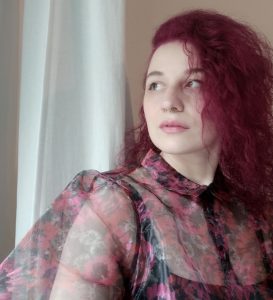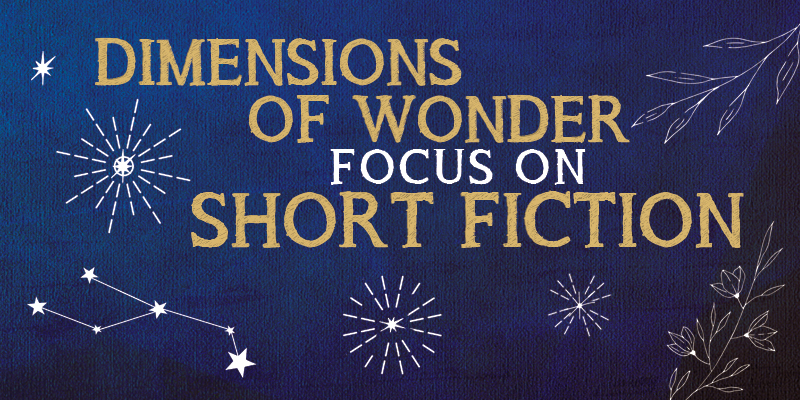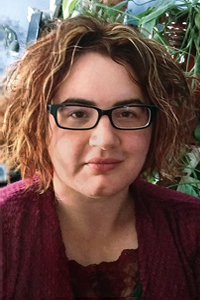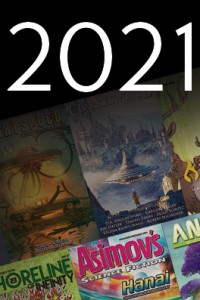DIMENSIONS OF WONDER: George Saunders in a Haunted Mansion with Chocolate Mint by Eugenia Triantafyllou
Welcome to our special short fiction issue! We’ve got an interview with Carmen Maria Machado, best known for her National Book Award-nominated collection Her Body and Other Parties. We hosted a roundtable discussion with short story powerhouses Ted Chiang, Kelly Link, and Usman T. Malik – among them they’ve won seven Nebula Award, five Hugo Awards, four World Fantasy Awards, and a couple of Stoker Awards, too.
We’ve invited some of the most impressive authors in the current short fiction field – A.T. Greenblatt, José Pablo Iriarte, Ai Jiang, Tobi Ogundiran, and Eugenia Triantafyllou – to tell us about their experiences, philosophies, and craft. Clarkesworld editor Neil Clarke provided a clear-eyed article enumerating the challenges faced by short fiction writers and genre magazines today. We also have spotlight interviews with the editors and publishers of the three of the newest and most impressive magazines in the field: khōréō, Omenana, and Sunday Morning Transport.
We hope this issue, taken as a whole, will provide you with a good sense of the state of SF/F short fiction today. Happy reading!
–Liza Groen Trombi & Tim Pratt
Links to articles:
11/13 Carmen Maria Machado: Core of Darkness
11/20 The Fire in the Dark: Roundtable with Ted Chiang, Kelly Link, and Usman T. Malik
11/30 The Stormy Age of SFF Magazines by Neil Clarke
12/5 Spotlight on Tobi Ogundiran
12/7 A Ramble on How Short Stories Have Shaped my Chaotic Writing Career by Ai Jiang
12/12 Spotlight on khōréō
12/14 Writing Short Stories in the Margins by A.T. Greenblatt
12/19 Spotlight on Omenana
12/21 Things Short Stories Did and Didn’t Teach Me About Writing and Selling Novels by José Pablo Iriarte
12/28 Spotlight on The Sunday Morning Transport
George Saunders
in a Haunted Mansion
with Chocolate Mint
by Eugenia Triantafyllou
 As I was gearing up to write this article, I went into a research frenzy on discovery writing, also known as pantsing: writing without much of an outline and little to no plot in mind. I complained about the lack of such articles to my writer friends and one of them suggested George Saunders’s book A Swim in a Pond in the Rain, in which Saunders mentions planning or outlining in less than favorable terms. My friend strongly disagreed. They are, as you might have guessed, an outliner. We ended up discussing other things our group disagrees about, including living in a haunted mansion and chocolate mint (that was me). In the end we figured the whole discussion we just had could easily be called pantsing a story, and thus a title was born.
As I was gearing up to write this article, I went into a research frenzy on discovery writing, also known as pantsing: writing without much of an outline and little to no plot in mind. I complained about the lack of such articles to my writer friends and one of them suggested George Saunders’s book A Swim in a Pond in the Rain, in which Saunders mentions planning or outlining in less than favorable terms. My friend strongly disagreed. They are, as you might have guessed, an outliner. We ended up discussing other things our group disagrees about, including living in a haunted mansion and chocolate mint (that was me). In the end we figured the whole discussion we just had could easily be called pantsing a story, and thus a title was born.
Now let’s see if we can pants an essay from the title.
George Saunders.
My pantsing process is a straightforward one. I start off with a weird premise (i.e. immigrant ghost, mermaids growing inside people’s bellies, flowers evolving into humans). The weirder the better because my brain enjoys tinkering with that weirdness, prodding to see why it’s there and what it all means. Most often than not, I write what the weird part or the premise is at the very beginning. ‘‘When Niovi tried to smuggle her mother’s ghost into the new country, she found herself being passed from one security officer to another, detailing her mother’s place and date of death over and over again’’ (Uncanny issue #32). This is not only because I want the reader to be interested in the story’s premise – but that too, have you heard of GHOSTPIGS? – but since I am a discovery writer I begin the journey as both the writer and the intrigued reader.
How can I be the reader of my own story before it’s even written? That’s because a lot of the things I write come straight from my subconscious while I’m typing. Before I start writing, the idea is a moving image in my brain, like a few seconds of a movie. Writing it down, and getting the voice and the PoV right, immediately reveals a myriad of things. That’s why I avoid outlining: I don’t want the story to feel written before it’s written; I want to give space to my subconscious to expand, ramble, and even make mistakes. Mistakes can lead to good, memorable sentences or quirks that make a story unique.
But a small plot point ahead or a specific theme to chase are valid bits of planning. In fact, I’d say that the planner to pantser continuum is more of a spectrum than a binary. I am one of those people who are very close to one end of the spectrum, but that doesn’t mean I don’t let bits and pieces of planning sneak in.
In a Haunted Mansion.
I am all for living in a haunted mansion. It feels like it would be fun buying a house with a built-in ghost and exploring all the deep, dark secrets. The same goes for the middle of your story.
To be honest the middle doesn’t matter, but not in the way you think. I am still early in the story and, although I might state the premise as early as in the first line, I still have more leeway to steer it here or there, dependent on what ideas or mood I am in, or what specific themes I want to explore. My narrator can visit the faceless girl in the attic or the basement to see what makes the stairs creak, or just linger in the living room along with the undead butler. The possibilities are, if not endless, at least plenty. The haunted mansion – and the middle of my story – is a mystery to me.
It doesn’t matter where I’ll stop and what I’ll be doing there, just as long as it serves my premise well, it conveys the right atmosphere, and is in line with my themes. I usually ask myself: what does the premise mean to me? How does its weirdness connect to my own experiences, and how can it convey an emotion or a vague concept that’s hard for me to express otherwise in a compelling way?
When the characters seem to develop their own agency and drive the story themselves, that’s how I know I am doing it right.
With chocolate mint.
Now I am reaching the end of the story. That’s the hard part. It’s like trying to bridge two completely opposite flavors like chocolate and mint (shivers). The first tricky part is bridging the middle with the end. Since I have decided which room in the mansion to claim, I am now beholden to that place (until revisions happen), those characters, those actions. So now I have to make it all make sense and connect them to the end. The bridge – that might not be more than a couple of paragraphs – might take me a long time.
Now, the second tricky part: chocolate, or mint? Bad ending or good ending? Or perhaps it’s chocolate mint, a mix of the two. By now most of the story is written and the path is narrowing. There aren’t many places I can go. If I had an ending in mind initially, the one I end up writing has changed a little. Maybe more hopeful or more horrific, perhaps the story ends earlier than anticipated, or we need to stay with the characters for a breath longer. Do what feels right for the story.
That’s what my personal process for writing a short story looks like. And if you think that this was too random and pants-y, remember: ever since I decided to go with this title and to use it as a loose structure for this essay, there was already a little planning going on.
Eugenia Triantafyllou is a Greek author and artist with a flair for dark things. Her work has been nominated for the Ignyte, Nebula, and World Fantasy Awards, and she is a graduate of Clarion West Writers Workshop. You can find her stories in Tor.com, Uncanny, Strange Horizons, and other venues. She currently lives in Athens with a boy and a dog. Find her on Bluesky @foxesandroses.bsky.social, her IG @eugeniatriantafyllou, or her website <www.eugeniatriantafyllou.com>.
 While you are here, please take a moment to support Locus with a one-time or recurring donation. We rely on reader donations to keep the magazine and site going, and would like to keep the site paywall free, but WE NEED YOUR FINANCIAL SUPPORT to continue quality coverage of the science fiction and fantasy field.
While you are here, please take a moment to support Locus with a one-time or recurring donation. We rely on reader donations to keep the magazine and site going, and would like to keep the site paywall free, but WE NEED YOUR FINANCIAL SUPPORT to continue quality coverage of the science fiction and fantasy field.
©Locus Magazine. Copyrighted material may not be republished without permission of LSFF.







